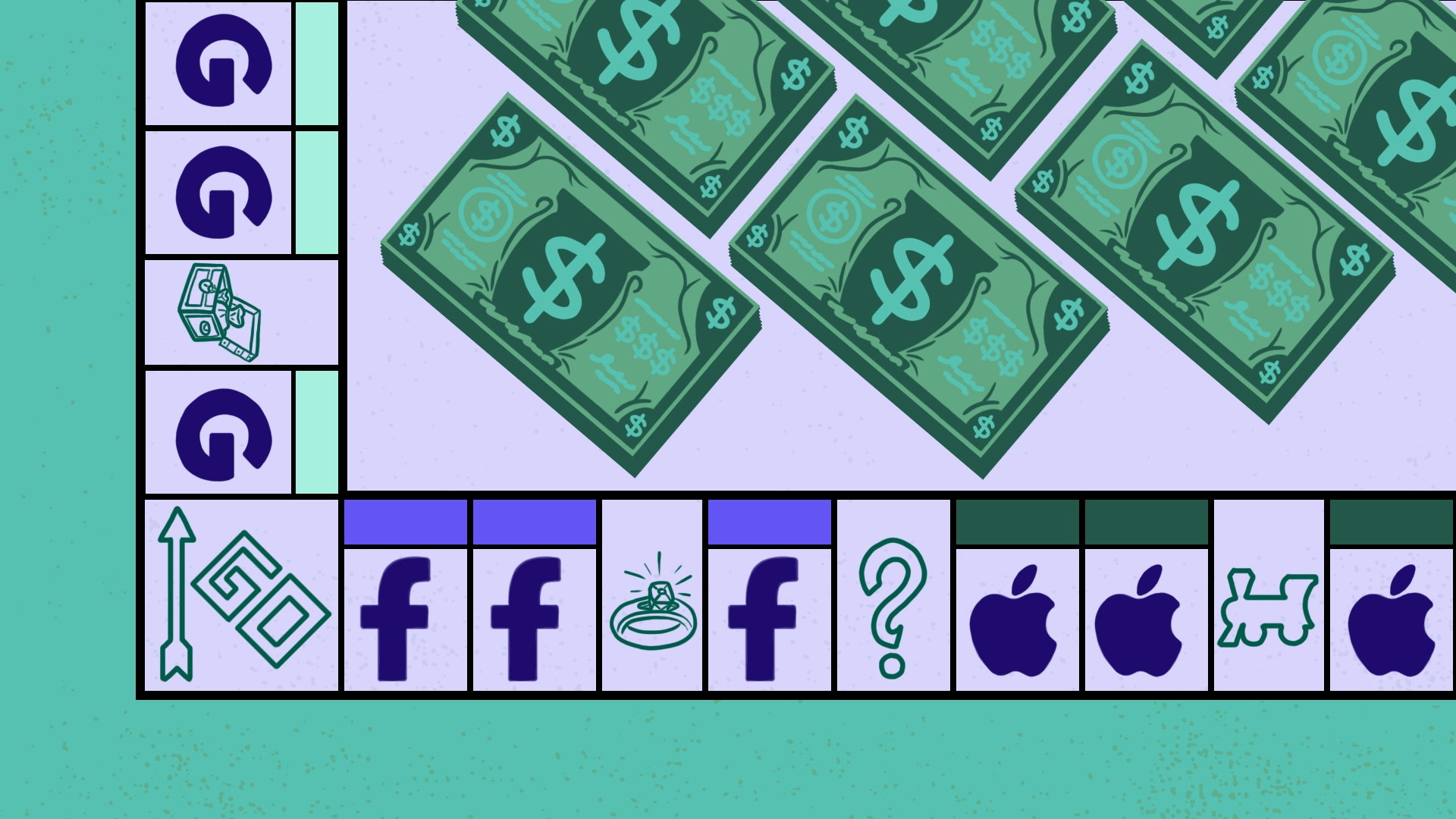The Story
When a corporation starts looking like they're becoming a monopoly, the gov might step in to say 'do not pass go.' Meet: antitrust lawsuits.
Back up. What’s a monopoly?
It's when a biz and the product or service it sells dominates an industry and faces little to no competition. That gives it a lot of power to control prices.
And what are antitrust lawsuits?
Antitrust laws and other regulations (hi, President Joe Biden's recent executive orders) were created to prevent any one business from dominating the market and becoming a monopoly. When it seems like a company could be violating those laws, an antitrust lawsuit may be brought against it.
Any cases I might've heard of?
Maybe the ones against...
Apple: In early May, Apple landed in court (again) over concerns that its App Store monopolizes iPhone app sales. Epic Games lawyered up after its game “Fortnite” was kicked off the store for offering an alternative payment option to customers – a move that meant no slice of sales for Apple. But Apple says the fees are crucial for covering security and privacy costs. In September, the federal judge decided, 'you're both right.' She gave Apple 90 days to allow Epic (and other companies) to use alt payment links in their apps. But she also declared Apple NOT a monopoly. Epic is filing an appeal. Apple might, too.
Amazon: In May, DC's attorney general sued Amazon on antitrust grounds, accusing the company of unfairly raising prices by restricting what marketplace sellers can do on other platforms. And earlier this year, a class action lawsuit was filed against Amazon for allegedly price-fixing the ebook market. Customers involved say Amazon’s been working with major publishers to drive up prices by as much as 30%. Got déjà vu? Apple was found guilty of doing this in 2013.
Google*: Last year, the search engine got hit with three antitrust lawsuits, filed by different groups of states and the federal gov. They say Google is using anti-competitive tactics to dominate search. Like getting companies to make it your default search engine. But Google says, 'I can't help that I'm popular.' And in July, a group of 36 states and the District of Columbia started going after Google again, claiming its Play Store on Android abuses its power over app developers.
Facebook: The Federal Trade Commission and 46 states, DC, and Guam sued the social network late last year for buying smaller companies like Instagram and WhatsApp in order to kill competition. Facebook says, 'No harm, no foul.' As in, the apps were only potential competitors and not a real threat to Facebook’s business. And they're all still free for users. At the end of June, the judge dismissed these complaints. But in mid August, the FTC refiled a beefed up case.
How do antitrust lawsuits affect me?
These cases (and appeals) can take years to play out before they make any direct impact on consumers. (And tech companies usually have the upper hand because proving they're violating antitrust laws and harming consumers is hard to do when many of their services are free.) But in general, breaking up monopolies could benefit your budget. Multiple companies within an industry means they have to compete for your business. Which could keep prices (relatively) low. And encourages companies to constantly innovate to have the latest and greatest products available.
What if I invest in companies being sued for antitrust issues?
Again, antitrust lawsuits can last a long time, so no need to panic. But know that while they drag on, they can also drag down a company's stock price. So don't be surprised if there's some volatility when news breaks about the lawsuits. That's a good reminder to diversify your investments, so that no single company or industry (whether it's involved in a lawsuit or not) has too big an impact on your portfolio.
Anything else I should know?
Some say antitrust laws give the gov too much power. Because it's not fair for Uncle Sam to limit winners' success in the market.
And one more thing: sometimes a monopoly can be a good thing that the gov says is okay because it benefits the public. Like when you need a consistent supply of an important commodity. Example: electric utilities.
theSkimm
When a company gets too big and powerful, it can spell bad news for consumers. And lately, Big Tech has been in the hot seat for monopolizing the market. Antitrust lawsuits are one way the gov tries to keep them in check.
*PS: GV (formerly Google Ventures) is a minority investor in theSkimm.
Subscribe to Skimm Money
Your source for the biggest financial headlines and trends, and how they affect your wallet.






